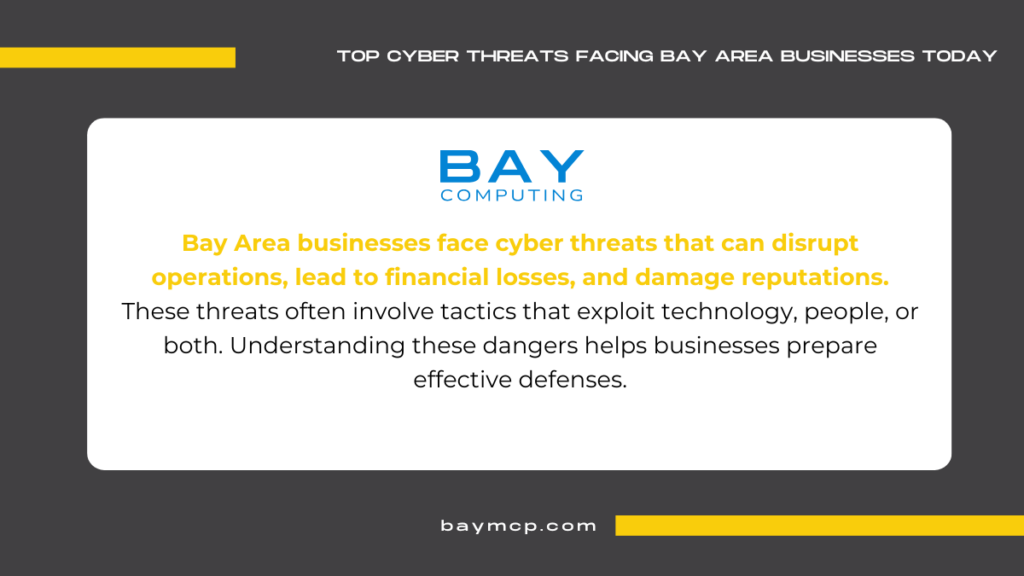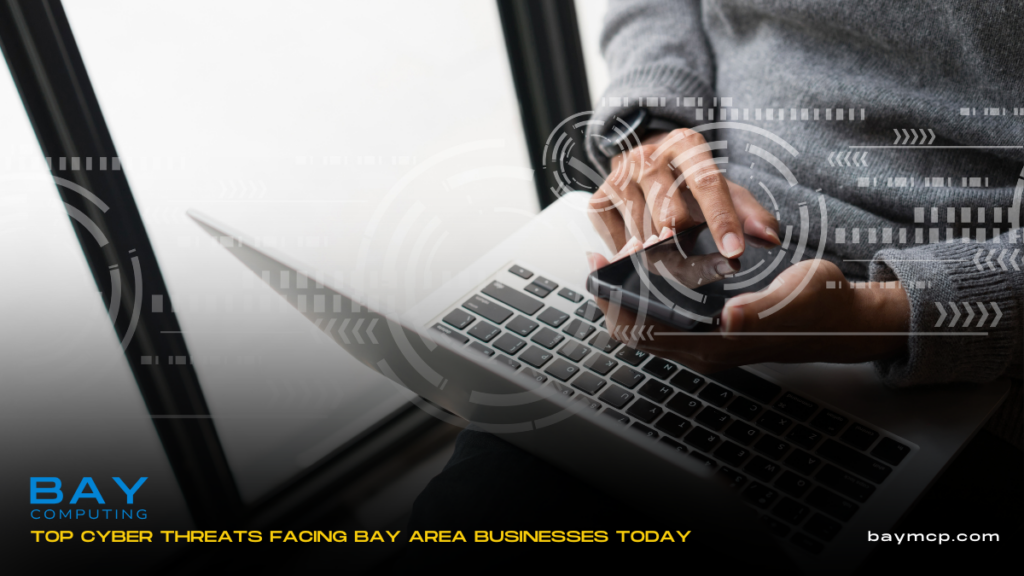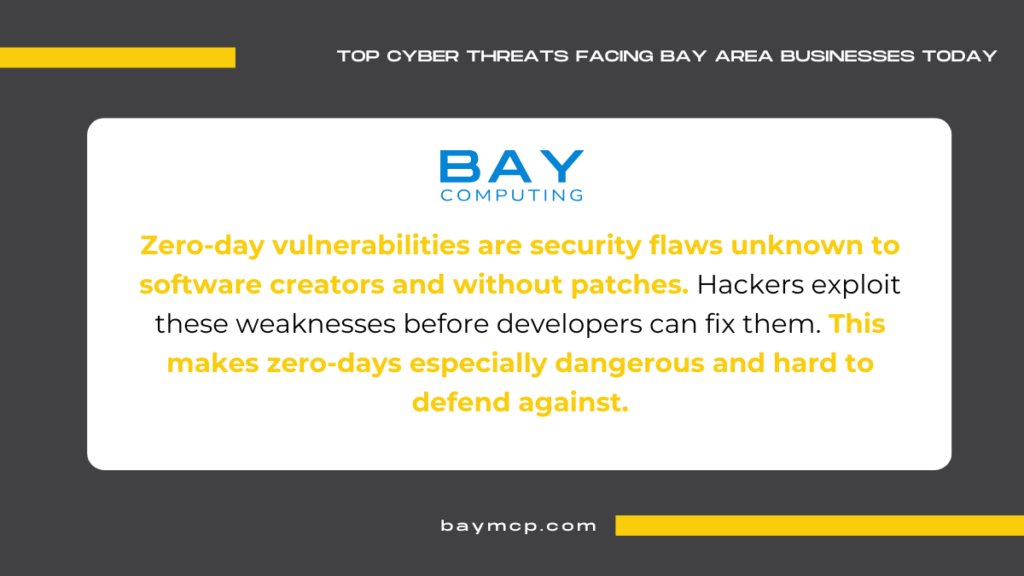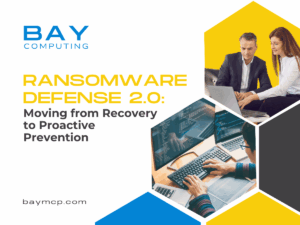Top Cyber Threats Facing Bay Area Businesses Today
Bay Area businesses face a range of cyber threats that put their data and operations at risk. These threats include phishing scams, ransomware attacks, malware infections, insider fraud, and denial-of-service attacks. Understanding these top cyber threats is crucial for businesses to protect themselves and reduce the chances of costly breaches.
Many companies in the region are now rethinking their cybersecurity plans as these attacks grow in number and complexity. Internal fraud and ransomware continue to cause serious damage, while common threats like phishing remain highly effective at targeting employees. Protecting a business requires strong defenses that address both external and internal risks.
The Bay Area’s unique business environment makes it a prime target for cybercriminals who exploit weaknesses in security systems. Being aware of the most common attacks helps leaders focus on solutions that strengthen their cyber defenses and keep their companies safe from harm. Learn more about key threats facing businesses today by exploring detailed strategies and risks.
Most Prevalent Cyber Threats for Bay Area Businesses

Bay Area businesses face cyber threats that can disrupt operations, lead to financial losses, and damage reputations. These threats often involve tactics that exploit technology, people, or both. Understanding these dangers helps businesses prepare effective defenses.
Ransomware Attacks
Ransomware is a type of malware that locks a business’s data until a ransom is paid. Many Bay Area businesses have experienced this, with attackers demanding thousands or even millions of dollars. The attacks usually start when employees click on malicious links or open infected attachments.
Once the system is locked, companies may lose access to critical files and customer data. This downtime can cost businesses thousands of dollars per day. Recovering data without backups is often impossible, which forces many to pay the ransom, though payment doesn’t guarantee full recovery or safety from future attacks.
Business Email Compromise
Business Email Compromise (BEC) targets email accounts to trick employees into sending money or sensitive data. Attackers impersonate executives or trusted partners, often using emails that look real but contain subtle changes.
In the Bay Area, BEC scams have led to significant financial losses, as businesses transfer funds to fake accounts. These attacks do not involve malware but rely on social engineering and spoofed email addresses. Training employees to verify unusual requests and using multi-factor authentication can reduce risk.
Phishing and Social Engineering

Phishing uses fake emails or websites to steal login details and personal information. It remains the most common cyberattack in the Bay Area due to its simplicity and success rate.
Cybercriminals craft convincing messages that prompt employees to reveal passwords or download malware. Social engineering also includes phone calls or text messages pretending to be from IT or vendors, convincing staff to bypass security protocols. Awareness campaigns and strong email filters help defend against these attacks.
Insider Security Risks
Insider threats come from employees, contractors, or partners who misuse access to harm the business. This can be intentional, like theft of data, or unintentional, such as accidentally exposing sensitive information.
Bay Area businesses face risks from insiders because of the high volume of confidential data and remote work arrangements. Regular monitoring, clear policies, and user access controls reduce insider risks. Training staff to recognize risky behavior is also essential.
Emerging and Evolving Threats Impacting the Bay Area
Bay Area businesses face complex cyber threats that exploit weaknesses in software, hardware, and human factors. These threats often target critical systems and data through advanced techniques, requiring constant vigilance and updated defenses.
Supply Chain Attacks
Supply chain attacks target software or hardware providers to gain access to many organizations at once. Hackers insert malicious code into trusted products or updates. This lets them bypass traditional defenses since the affected software is considered safe.
Bay Area companies experience these attacks because of their reliance on regional tech suppliers. Attackers aim for widely used platforms to maximize impact. Businesses must carefully vet vendors, monitor for unusual activity, and deploy strict update controls.
Key prevention steps include:
- Verifying the integrity of software updates
- Limiting third-party access
- Conducting regular audits of suppliers
Zero-Day Vulnerabilities

Zero-day vulnerabilities are security flaws unknown to software creators and without patches. Hackers exploit these weaknesses before developers can fix them. This makes zero-days especially dangerous and hard to defend against.
Bay Area firms face high risks as attackers focus on widely used software and systems common in the region’s tech landscape. Rapid detection and response systems must be in place to reduce exposure.
Effective countermeasures involve:
- Continuous system monitoring
- Prompt incident response planning
- Collaborating with cybersecurity info-sharing groups
AI-Powered Threats
Attackers increasingly use AI to automate attacks, making them faster and harder to detect. AI can mimic user behavior, craft convincing phishing emails, or identify weak points in defenses. This elevates threats for Bay Area businesses.
AI tools also help attackers adapt attacks in real time, requiring defenders to use AI-based solutions for tracking and blocking threats. Organizations must train staff to recognize sophisticated AI-driven scams and update policies to cover new attack methods.
AI-powered threat features include:
| Feature | Description |
|---|---|
| Automated attacks | Rapid, repeated attempts on many targets |
| Deepfake phishing | Convincing impersonation using AI |
| Adaptive malware | Malware that changes to avoid detection |
Ready to Strengthen Your Cyber Defenses?
Don’t wait for a breach to take action. Bay Computing helps Bay Area businesses stay ahead of evolving cyber threats with proactive, tailored cybersecurity solutions. From phishing prevention and ransomware protection to insider threat monitoring and zero-day defense—we’ve got you covered.
Let’s secure your future—contact us today for a free cybersecurity consultation.




